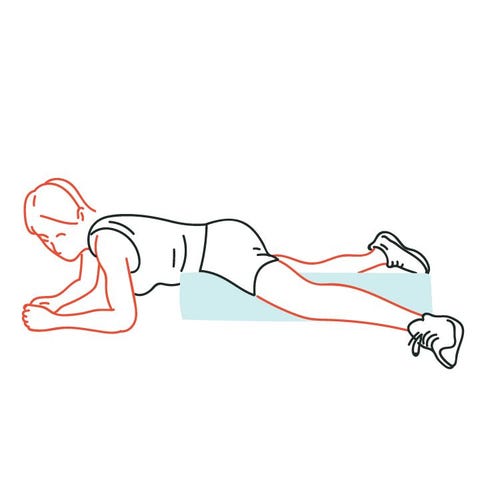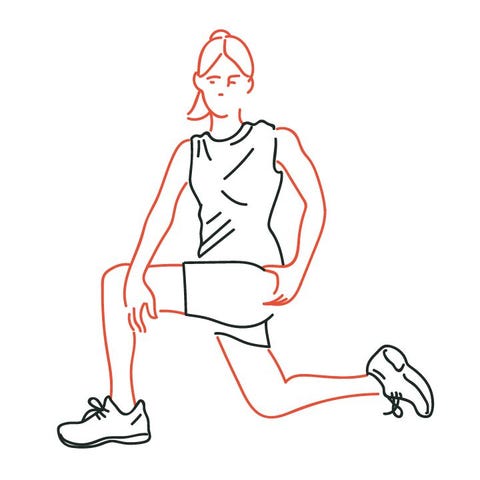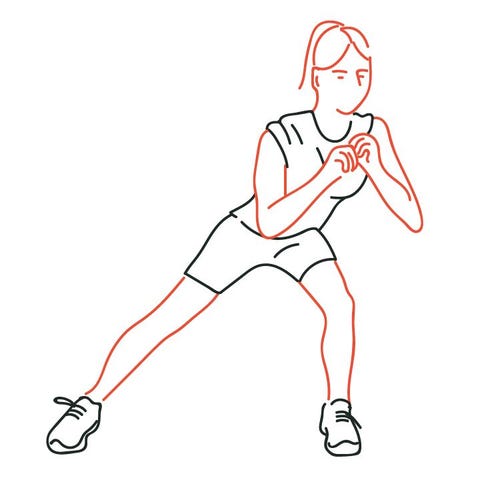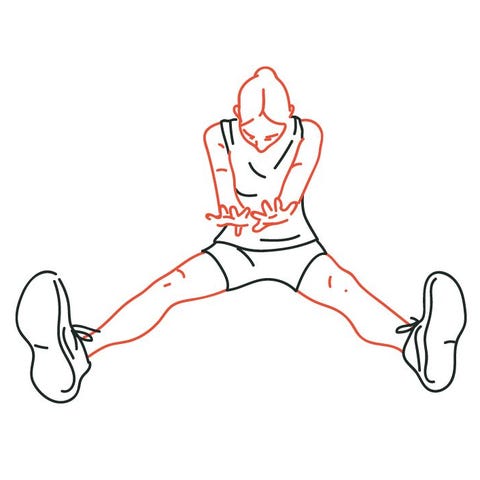
There are certain words that instantly make you feel awkward, and “groin” is definitely one of them. Equally as awkward? Talking about uncomfortable groin pain.
But to heal a pulled groin, you need to understand why it happens. Your groin region—the area between your stomach and thighs—is comprised of five muscles that work together to help you move your legs with a full range of motion: the pectineus, gracilis, adductor magnus, adductor longus, and adductor brevis.
If you’re young and active, you might start feeling groin pain if you skip a warmup and jump directly into your workout. Overuse, injuries, or pulling a muscle can all cause aches, soreness, and pain down there.
The fix? Stretching these muscles out help relax the pulled groin and hip flexors when they’re especially tight, explains Mark Vorensky, PT, DPT, SCS, physical therapist at New York University’s Langone’s Sports Performance Center. At the same time, “strengthening will allow the groin muscles and region to be more resilient,” he says.
Here, Vorensky offers up five pulled groin stretches to get you going, all of which help to release the hip flexors and groin muscles. Incorporating these into your routine twice weekly will teach these muscle groups how to relax and prepare you for other effective strengthening exercises down the road.
These deep hip stretches will help you find relief ASAP.
1. Upper-Thigh Foam Rolling Stretch
Why it helps: “Foam rolling is a nice way to relax the adductor muscle group, which attaches into the groin, to allow for more relaxed stretching and motion,” says Vorensky. (Find the right foam roller for you here.)
How to do it: With the foam roller placed on the inside of your thigh, slowly rock forwards and backwards using your elbows and your opposite knee. Roll from just above your knee to the groin for 30 seconds. Do 3 sets on each side.
2. Half-Kneeling Hip Stretch
Why it helps: “Often with hip pain, the hip flexors can be guarded and tight,” says Vorensky. Using trunk rotation (your chest, abdomen, and back), this stretch will target the hip flexor and groin muscles to ease groin pain.
How to do it: Start in a half kneeling position. You are aiming to stretch the bag leg’s hip flexor and groin muscles. Rotate the trunk (upper body) to the same side as your front leg. Squeeze your glute on the rear leg to increase the stretch of the hip flexor and groin muscles. If you do not feel a stretch, add a gentle lean forward. Complete for 15 seconds. Rest for 15 seconds. Do 4 to 6 times per side.
3. Side Lunge Groin Stretch
Why it helps: Lunges will strengthen and stretch your muscles at the same time. “Exercises that work on strengthening while the muscle is lengthening is effective in helping with flexibility,” says Vorensky.
How to do it: Start standing with both feet together. Take a step to the side with your right foot, slowly lowering into a lunge. Keep the toes of both feet pointed straight forward; this will make sure you are targeting the groin muscles. Press back to start for one rep. Complete 6 to 10 reps and repeat on opposite side. Do 2 to 3 sets, resting 30 to 60 seconds between each.
4. Simple Isolated Short Groin Stretch
Why it helps: This relaxing isolated groin stretch is great for the end of your workout as a cooldown. As a whole, these challenging-but-comfortable stretches just feel good and help your body relax, so incorporate them into your routine after your sweat session is finished, says Vorensky.
How to do it: Sit up straight with the soles of your feet touching in front of you, creating a butterfly-like shape. Using your elbows, gently push down on your knees to really deepen the stretch in your groin region. Don’t push hard—this should be gradual, increasing the range of motion over a 30-second period. Rest 30 seconds. Do 3 to 5 sets.
5. Simple Isolated Long Groin Stretch
Why it helps: Another great cooldown exercise, use this stretch to target the groin and hamstring muscles, suggests Vorensky.
How to do it: Sit up straight with your legs forming a wide “V” shape. Gradually lean your trunk forward, reaching straight out toward your toes, to create a gentle stretch for 30 seconds. Rest 30 seconds. Do 3 to 5 sets.
Source: www.prevention.com



























